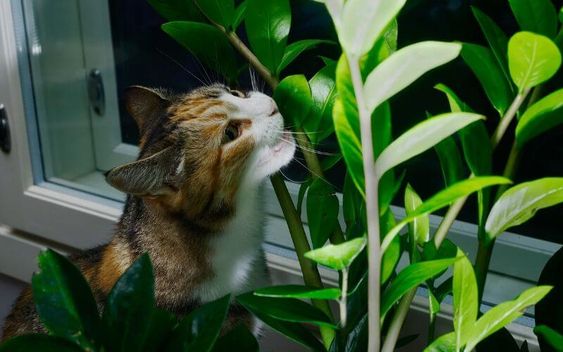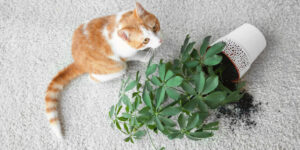
Are ZZ Plants Toxic to Cats?
The ZZ plant, scientifically known as Zamioculcas zamiifolia, has gained popularity among houseplant enthusiasts for its striking appearance and low maintenance requirements. However, a significant concern for pet owners, particularly those with cats, is whether this plant is toxic. This article will delve into the toxicity of ZZ plants, the symptoms of poisoning in cats, and how to safely incorporate them into a pet-friendly home.
Understanding ZZ Plant Toxicity
ZZ plants contain calcium oxalate crystals in their sap, which are responsible for their toxic properties. When ingested, these crystals can cause irritation and discomfort in both humans and pets. The toxicity level of the ZZ plant is classified as mild, meaning that while it can cause adverse effects, it is not typically life-threatening.
Why Are ZZ Plants Toxic?
The primary reason for the toxicity of ZZ plants lies in the presence of calcium oxalate crystals. These sharp, needle-like structures serve as a defense mechanism against herbivores. When chewed or ingested, they can cause:
- Oral pain: The crystals can lead to a burning sensation in the mouth.
- Gastrointestinal upset: Symptoms may include drooling, vomiting, and diarrhea.
- Skin irritation: Contact with the sap can cause minor skin rashes or irritation.
Symptoms of ZZ Plant Poisoning in Cats
If a cat ingests or comes into contact with a ZZ plant, it may exhibit several symptoms. These include:
- Oral pain: Cats may paw at their mouths or refuse to eat due to discomfort.
- Drooling: Excessive salivation can occur as a reaction to the irritation.
- Vomiting: Cats may vomit if they ingest parts of the plant.
- Diarrhea: Gastrointestinal upset can lead to loose stools.
- Swelling: In rare cases, there may be swelling of the upper airway, which could make breathing difficult.
Is It Safe to Have ZZ Plants Around Cats?
While ZZ plants are considered toxic, many pet owners successfully keep them in homes with cats. The key lies in proper placement and monitoring. Here are some tips for safely incorporating ZZ plants into your home:
- Placement: Keep ZZ plants out of reach of curious cats. Consider placing them on high shelves or using hanging planters.
- Education: Teach your cats not to nibble on houseplants by providing safe alternatives like cat grass.
- Monitoring: Observe your pets’ behavior around the plants and be vigilant for any signs of distress.
Benefits of Keeping ZZ Plants
Despite their toxicity concerns, ZZ plants offer several benefits that make them appealing choices for indoor gardening:
- Air Purification: ZZ plants are known to improve indoor air quality by filtering toxins.
- Low Maintenance: They require minimal care and can thrive in low light conditions.
- Aesthetic Appeal: Their glossy leaves add a touch of elegance to any space.
Table: Comparison of Toxicity in Common Houseplants
| Plant Name | Toxicity Level | Symptoms in Cats | Safe Alternatives |
|---|---|---|---|
| ZZ Plant | Mild | Oral pain, drooling, vomiting | Cat grass |
| Pothos | Moderate | Oral irritation, vomiting | Spider plant |
| Philodendron | Moderate | Oral pain, gastrointestinal upset | Bamboo palm |
| Spider Plant | Non-toxic | None | N/A |
FAQ Section
1. Are all parts of the ZZ plant toxic?
Yes, all parts of the ZZ plant contain calcium oxalate crystals and can be harmful if ingested.
2. What should I do if my cat eats a ZZ plant?
If you suspect your cat has ingested part of a ZZ plant, monitor them closely for symptoms like drooling or vomiting. Contact your veterinarian for advice.
3. Can I keep a ZZ plant if my cat is curious?
Yes, but it’s essential to place the plant out of reach and observe your cat’s behavior around it.
4. How can I tell if my cat is having an allergic reaction?
Signs of an allergic reaction may include swelling around the mouth or eyes, difficulty breathing, or severe vomiting. Seek veterinary care immediately if these symptoms occur.
5. Are there any non-toxic alternatives to ZZ plants?
Yes! Some non-toxic alternatives include spider plants, Boston ferns, and certain types of succulents.
Conclusion
In summary, while ZZ plants are mildly toxic to cats due to their calcium oxalate content, they can still be safely enjoyed in homes with proper precautions. By understanding their toxicity and taking steps to minimize risk, pet owners can enjoy the beauty and benefits of these popular houseplants without compromising their pets’ safety.For more detailed information on houseplant toxicity and care guidelines, you can refer to Wikipedia.


